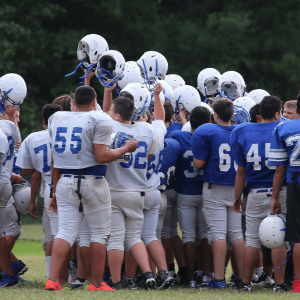
5 Ways of Teaching Kids Leadership
Teaching kids leadership is often a topic we don’t spend enough time on as parents and coaches.
The ability to lead is a skill that found in almost every successful athlete.
There are many ways to be a leader.
Some leaders are quiet, some are loud and others lead without a sound.
In any case there are things we can do as parents and coaches that will help with teaching kids leadership.
5 Ways of Teaching Kids Leadership
1. Develop problem-solving skills.
Adversity happens to us all.
How we deal with adversity often determines our level of success.
We need to teach our kids that problems are a normal part of life but there are always solutions.
When faced with problems, kids need to keep calm, assess the problem, and create a plan to find a solution.
These are things we can practice at home with homework, chores, and even at play.
I remember when I was a kid we used to play wiffleball for hours.
The problem we often had was a broken or lost wiffleball.
So we came up with a new game. We used paper towel, scrunched it up and covered it with electrical tape.
We then used a tennis racket for a bat and voila! Tape ball was born.
Great game for a bunch of 8 year olds. (and the ball sent a mile off the tennis racket which caused us other problems. Like finding a bigger field without windows.)
2. Teach decision-making skills.
Good leaders make good decisions.
Great leaders make the same decisions faster and under pressure.
 The decisions we make define our lives.
The decisions we make define our lives.
It’s no different on a field in a game.
We can easily help teach this in our homes.
How many decisions do you make for your children that they could be making themselves on a daily basis?
What to wear?
What to eat?
How to spend their money?
These are very basic decisions but your kids need to take ownership of them.
There are consequences, both good and bad, for the decisions we make.
Don’t shield your child by making all their decisions for them. Let them learn through making decisions.
Even if some are wrong.
Both problem-solving and decision-making are critical to developing self-esteem and self-confidence.
These are skills that will serve them every day of their lives in any environment.
3. Emphasize the importance of communication.
Leaders have to be good communicators.
This doesn’t mean that a leader has to be vocal in a rah-rah kind of way.
It means they have to able to talk to coaches and teammates.
They need to be able to lift up their teammates when needed.
Leaders have to communicate with coaches to help coaches understand the mood and pulse of the team.
They need to be an example to others and show how to interact properly on a team.
We can help our athletes by encouraging them to talk to us about their day.
Start a discussion at home.
To many times, as parents, we just react to things instead of starting a meaningful conversation.
Be a good listener and your child will learn that aspect of communication as well.
4. Encourage more team activities.
Great leaders take advantage of every opportunity to compete on a team and are always looking for the next one. #leadership Share on XEvery opportunity to compete on a team is a chance to hone your skills as a teammate and a leader.
Learning to compete, lead and succeed in a team environment is invaluable.
These are lessons that will carry forward into their classroom, their home and someday their career.
There are a ton of opportunities for team activities in sports and out.
Clubs at school, church or in the community all offer the chance to participate in team activities.
Help you child take advantage of as many of these opportunities as possible.
5. Practice positivity.
Belief in yourself is the first ingredient to leadership.
A belief in your team comes in a close second.
Staying positive, even in the face of adversity, will define you as a leader.
If you hang your head as a leader, what do you think your teammates will do?
You have to stay positive and you have to believe it.
Someone is always watching so you have to be genuine with your positivity.
Just the rah-rah stuff won’t get it done.
To be a great leader your positivity has to be felt not just heard.
As parents and coaches we can teach this by being the example.
Practice positivity at home and it becomes a pillar of teaching kids leadership.
If you you found value with today’s post please like, comment and share.
Play Big!
Coach Steve





